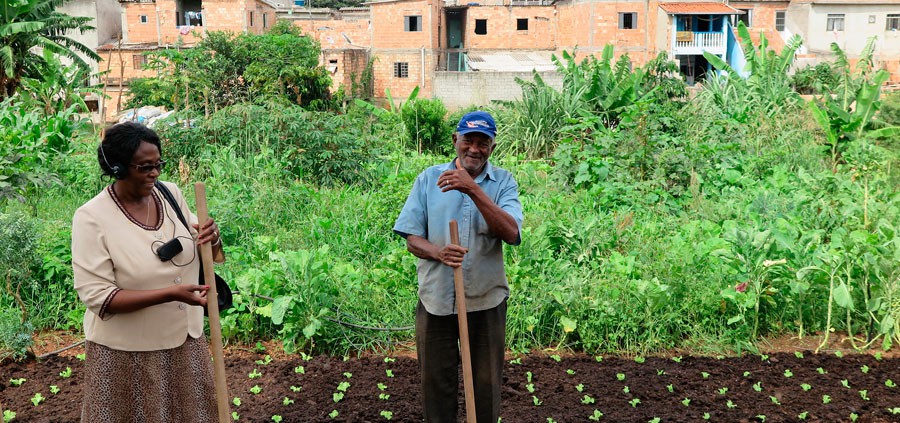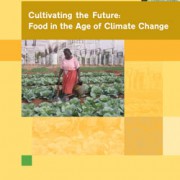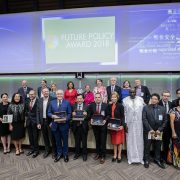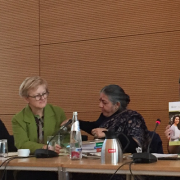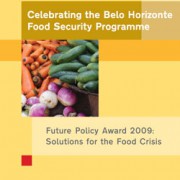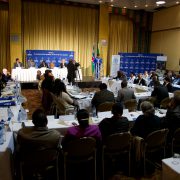Study Trip to Belo Horizonte
Windhoek/Belo Horizonte/Hamburg, February 12, 2015: In an effort towards eradicating malnutrition, a delegation from Namibia has travelled to Brazil to study the successful food and nutrition security programme of the city of Belo Horizonte, strengthen their understanding of food security and sign cooperation agreements. With programmes on urban agriculture, food banks and school lunches, Belo Horizonte has reduced child mortality by 60 percent over the past 12 years, decreasing malnutrition among children to 3%. The study tour was organised by the World Future Council to bring about a knowledge exchange between experts.
In the Namibian capital Windhoek, those responsible have already begun to build a system according to the Brazilian model. Mayor Muesee Kazapua first travelled to Belo Horizonte in 2013 to gain first-hand experience of the excellent food security programme. What followed was a workshop in Windhoek, where the World Future Council brought together experts from Belo Horizonte to share their experiences with the Namibian mayors. Now, the cities have formalised their cooperation by signing a Memorandum of Understanding (MOU). “I am very happy with this partnership and hope we can join hands for the common good of our two cities and peoples. The signing of this MOU, will also strengthen the already cordial bilateral relations between Brazil and Namibia and the south-south municipal government cooperation,” says Mayor Muesee Kazapua.
The Food Security Programme of Belo Horizonte is based on the Right to Food for all citizens and incorporates a set of 20 interconnected programmes. It has proven effective in fighting hunger and malnutrition and improving the livelihoods of citizens by supporting the local economy. The approach could be adapted for cities throughout Africa. Since awarding the policy with a Future Policy Award in 2009, the World Future Council has been working to strengthen the understanding that food security is more than just the provision of food and that balanced diets are important.
“What was intended as a knowledge transfer on the food security model of Belo Horizonte grew into a wider cooperation, including education and cultural issues, not only between the cities of Belo Horizonte and Windhoek but between Brazil and Namibia in general. This type of local, city to city exchange can be a model in itself on how to tackle the challenges of our times efficiently, joining hands to create healthy, just societies and protecting the rights of current and future generations,” remarked Lorena Fischer, Policy Officer of the World Future Council.
Rodrigo Oliveira, Municipal Deputy Secretariat of International Relations of the City of Belo Horizonte, stressed that “a cooperation at municipality level is very rewarding because you get to meet real people with similar problems. The exchange is also an opportunity for us to present ourselves to international communities and to constantly improve our work. We are very grateful to the World Future Council, without which this exchange between Namibia and Brazil would not take place. The issue is complex and the responsibility is huge but so is the potential to transform!”
For more high-resolution pictures of the study tour, please contact Ina Neuberger.
Flickr album
Media Contacts
Ina Neuberger
Senior Consultant WFC
ina.neuberger@worldfuturecouncil.org
Namibia: +264 81 244 39 81
The World Future Council
The World Future Council brings the interests of future generations to the centre of policy-making. Its up to 50 eminent members from around the globe have already successfully promoted change. The Council addresses challenges to our common future and provides decision makers with effective policy solutions. In close cooperation with civil society actors, parliamentarians, governments, business and international organizations the World Future Council identifies “best policies” around the globe. The World Future Council is registered as a charitable foundation in Hamburg, Germany.
